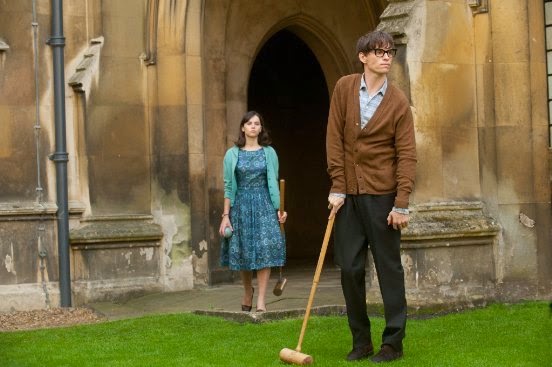The Theory of Everything
The Theory of Everything
(2014)
A Review by Grant Kanigan
Directed by: James Marsh
Written By: Anthony McCarten, based on
Jane Hawking's book
Starring: Eddie Redmayne, Felicity Jones
David Thewlis
Rating: G
Release Date: September 7th 2014
 |
| Felicity Jones & Eddie Redmayne in The Theory of Everything Photo by Liam Daniel - © UNIVERSAL PICTURES INTERNATIONAL |
The Theory of Everything isn't so much about Stephen and Jane Hawking's love story, but more of the story that befell them as they fell in love. Both students at Cambridge University, (I guess they couldn't get into Oxford - zing! Oh well, at least it's not Yale. Pfft. Yale), the pair hit it off at a party bringing in the new semester. He a doctorate student in physics, and she an Arts student, the two immediately find each other's interests fascinating. Through a series of meet cutes and dates the duo soon find themselves falling madly in love. It's through this fantastic affair that Stephen begins to focus his doctoral studies on time, black holes and the big bang. Either through the fog of love and intellectual freedom, (the film implies Hawking's doctoral supervisor considers him at the very least an equal), Hawking ignores the incessant shaking of his hands, and his habit of tripping all the time. It's not until he falls over his own feet and falls flat on his face, knocking himself out, that Hawking realizes how serious of a problem he really has.
Diagnosed with motor neuron disease at 21, (otherwise known as MND, ALS, or Lou Gehrig's disease), Hawking is told he only has two years to live. The disease slowly wipes out the muscle control components of the brain, slowly removing the ability to walk, grab, or speak, i.e., the ability to move. No matter what, Hawking still has the power to voice his intellect, but over the course of his disease, the doctor warns, " eventually only he may be able to hear it."
What follows is Hawking's slow descent into the wheelchair he resides in today. Yet, that's not the main focus on the film. Thankfully, the film gives a decent enough time for a crash course in physics, (we can see Hawking come to some inspiring conclusions about black holes and the nature of time), and doesn't shy away from being intellectual. It's this progression towards the publishing of his most well known work, his 1988 magnum opus A Brief History of Time, that drives the film, and Jane's insistence on keeping him positive. As Jane Hawking, Felicity Jones holds up to Redmayne's performance magnificently. Her role demands she show strength, yearning, love, hate, and vulnerability, and Jones nails all the high notes. Redmayne, however, gives a mesmerizing performance.
It's too often that audiences see a performance that requires the actor to physically manipulate their body. Christian Bale did so in The Machinist, so much so that it almost killed him in real life; as did Jared Leto & Matthew McConaughey in The Dallas Buyers Club. As well, Daniel Day Lewis metamorphosized into Christy Brown, a man suffering from extreme cerebral palsy in My Left Foot. Yet, these actors often forget that a role is not just physical. While the actors could have relied on talent alone in the aforementioned films, they too often rely on their physical appearance to do their acting for them - in My Left Foot, while Lewis was magnificent, he too often played to the physicality of his role, and like much of his work, he wound up seeming like an impressionist, rather than a thespian. It's miraculous, that after such highly regarded work that Redmayne trumps them all. Slowly moving into more and more extreme MND, never once does it seem as if Redmayne is acting. I caught myself more than once asking how they got an actor with MND to participate in such a film, only to realize it's simply Redmaynes performance. Yet, it's not the focal point of the film. Like Hawking, Redmayne moves past the physical limitations of his role in order to showcase who Hawking really was, what drove him, how he loved, hated, and lost. Redmayne's performance alone is worth seeing this film as soon as possible.
All in all, The Theory of Everything is a magnificent film. The cinematography is creative, and lets us see through both Jane and Stephen Hawking's eyes. As well, its off colour tones remind me of some of the great shots in Francis Ford Coppola's early work. Additionally, the script gives ample time to flesh out Jane and Stephen as real characters, not infallible historical geniuses; giving time to their romance, Stephen's research, and how his physical limitations took a toll on everything around him. However, MND was a huge part of Hawking's life, and the panic his diagnosis creates leads the first half of the film. Yet, we never see past the physicality of Hawking, except through Redmayne's performance. If he was given a diagnosis of death in two years in his twenties, how is he still alive today? Why was it absolutely imperative that he get a tracheotomy? Couldn't he have just got a temporary breathing tube, (much like the apparatus Christopher Reeve had in his last few years?). These aren't complex questions and they probably have simple answers, (a quick Google search shed some light on Hawking's longevity in beating the odds against MND). It baffles me as to why they wouldn't quickly answer these queries, seeing how they spend ample time going through Hawking's theories on Physics. However, these are minimal issues in the grand scheme of things, and The Theory of Everything is still an excellent film, in large part thanks to Eddie Redmayne. Although Gyllenhaal's performance in Nightcrawler was fearless, Redmayne in The Theory of Everything is transcendent. Gyllenhaal met the bar for Oscar worthy acting. Redmayne just rose it.
What follows is Hawking's slow descent into the wheelchair he resides in today. Yet, that's not the main focus on the film. Thankfully, the film gives a decent enough time for a crash course in physics, (we can see Hawking come to some inspiring conclusions about black holes and the nature of time), and doesn't shy away from being intellectual. It's this progression towards the publishing of his most well known work, his 1988 magnum opus A Brief History of Time, that drives the film, and Jane's insistence on keeping him positive. As Jane Hawking, Felicity Jones holds up to Redmayne's performance magnificently. Her role demands she show strength, yearning, love, hate, and vulnerability, and Jones nails all the high notes. Redmayne, however, gives a mesmerizing performance.
It's too often that audiences see a performance that requires the actor to physically manipulate their body. Christian Bale did so in The Machinist, so much so that it almost killed him in real life; as did Jared Leto & Matthew McConaughey in The Dallas Buyers Club. As well, Daniel Day Lewis metamorphosized into Christy Brown, a man suffering from extreme cerebral palsy in My Left Foot. Yet, these actors often forget that a role is not just physical. While the actors could have relied on talent alone in the aforementioned films, they too often rely on their physical appearance to do their acting for them - in My Left Foot, while Lewis was magnificent, he too often played to the physicality of his role, and like much of his work, he wound up seeming like an impressionist, rather than a thespian. It's miraculous, that after such highly regarded work that Redmayne trumps them all. Slowly moving into more and more extreme MND, never once does it seem as if Redmayne is acting. I caught myself more than once asking how they got an actor with MND to participate in such a film, only to realize it's simply Redmaynes performance. Yet, it's not the focal point of the film. Like Hawking, Redmayne moves past the physical limitations of his role in order to showcase who Hawking really was, what drove him, how he loved, hated, and lost. Redmayne's performance alone is worth seeing this film as soon as possible.
All in all, The Theory of Everything is a magnificent film. The cinematography is creative, and lets us see through both Jane and Stephen Hawking's eyes. As well, its off colour tones remind me of some of the great shots in Francis Ford Coppola's early work. Additionally, the script gives ample time to flesh out Jane and Stephen as real characters, not infallible historical geniuses; giving time to their romance, Stephen's research, and how his physical limitations took a toll on everything around him. However, MND was a huge part of Hawking's life, and the panic his diagnosis creates leads the first half of the film. Yet, we never see past the physicality of Hawking, except through Redmayne's performance. If he was given a diagnosis of death in two years in his twenties, how is he still alive today? Why was it absolutely imperative that he get a tracheotomy? Couldn't he have just got a temporary breathing tube, (much like the apparatus Christopher Reeve had in his last few years?). These aren't complex questions and they probably have simple answers, (a quick Google search shed some light on Hawking's longevity in beating the odds against MND). It baffles me as to why they wouldn't quickly answer these queries, seeing how they spend ample time going through Hawking's theories on Physics. However, these are minimal issues in the grand scheme of things, and The Theory of Everything is still an excellent film, in large part thanks to Eddie Redmayne. Although Gyllenhaal's performance in Nightcrawler was fearless, Redmayne in The Theory of Everything is transcendent. Gyllenhaal met the bar for Oscar worthy acting. Redmayne just rose it.
Grant's Rating 4.5/5
Eddie Redmayne, Felicity Jones & David Thewlis in The Theory of Everything: "Keep Going"



Comments